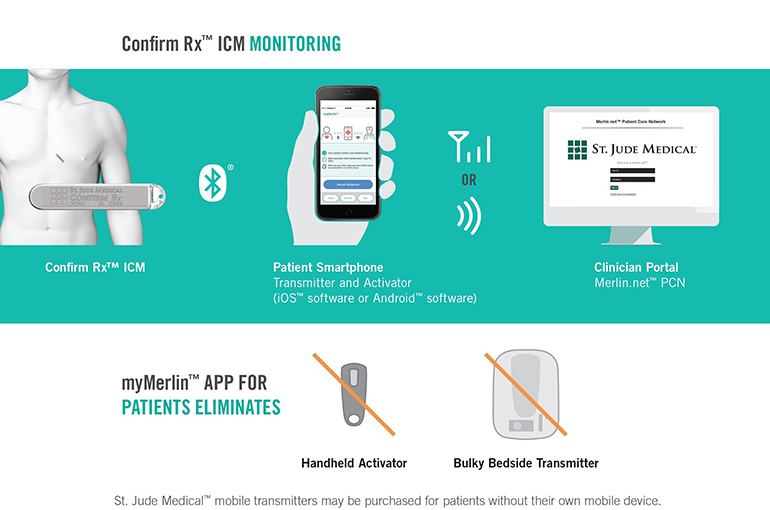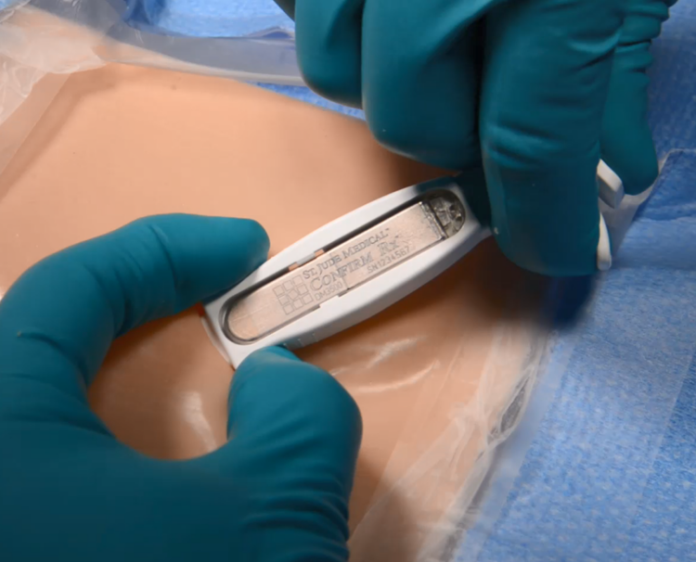Abbott announced the launch of a new, smarter heart monitor for better arrhythmia detection — positive news for people at risk for irregular heartbeats. Now with CE Mark in Europe and U.S. Food and Drug Administration (FDA) clearance, the next-generation Confirm Rx insertable cardiac monitor (ICM), a paperclip-sized implantable device, combines smartphone connectivity and continuous, remote monitoring to track unpredictable heart rhythm problems for fast and accurate diagnosis.
An arrhythmia is an abnormal heart rhythm that can lead to symptoms such as the feeling that the heart is racing, dizziness, shortness of breath or fainting. Living with an irregular heartbeat can lead to constant questions for people battling symptoms. For the 33.5 million people living with atrial fibrillation (AFib) — the most common arrhythmia — many do not even know they have the condition.

Inserted just under the skin in the chest above the heart during a quick, minimally invasive outpatient procedure, the Confirm Rx ICM device is the only ICM on the market, according to Abbott, that syncs to a smartphone via Bluetooth and transmits information to the physician to help identify irregular heartbeats quickly. Abbott’s mobile app eliminates the need for an additional transmitter and is user-friendly health technology translated in nearly 40 languages.

Wearables used to track cardiac arrhythmias have limitations when it comes to making a clinical diagnosis. Many require recharging at night, which can lead to missing irregular heartbeats that may occur sporadically and infrequently. Others require some level of interaction by the person to record symptoms, which may not be top of mind when feeling light headed, dizzy or experiencing a rapid heart rate.
Unlike other monitoring technology that can lead to gaps in arrhythmia detection, Confirm Rx ICM provides continuous 24/7 monitoring. The new detection technology in Confirm Rx ICM reduces false detection by 97 percent and avoids alerting physicians of irregular heartbeats that may not actually signal a cardiac arrhythmia.
“The rise in health monitoring has undoubtedly increased awareness of arrhythmias such as AFib, but many of these devices still aren’t leading to an improved diagnosis or solving the key clinical challenges for people at risk,” said Sean Beinart, M.D., a cardiologist with Adventist Healthcare in Rockville, Md. “Like a guardian for heart health, Confirm Rx ICM can relay important data about a person’s heart rhythm through their smartphone and alert their care team to a potentially dangerous heart event. With Abbott’s new technology, I can better identify risk — making it actionable for me and life-changing for my patient.”
Abbott’s new device has shown success in many patients who suffer from heart irregularities. However, as the article stated, the device tracks irregular heartbeats which can detect arrhythmias and many people suffer from these abnormal heart rhythms but are unaware of it. Although the concept of everyone having bluetooth devices planted inside them to track health seems dystopian, the article brings up a great point about how many of these heart trackers are targeted towards individuals who already are aware of their condition.
Another topic this article brings up is the difference 24/7 monitoring makes. For most people, they only check their blood pressure at the doctor. Others may have a home monitor. Some may even have wearable trackers but they still might have to take it off to charge. As mentioned in the article, these irregularities could go undetected because they occur during the times when the person is not using or wearing their tracker. The results from this device have proven the benefits of 24/7 monitoring but, for most, is an implanted 24/7 monitor the most feasible solution?




